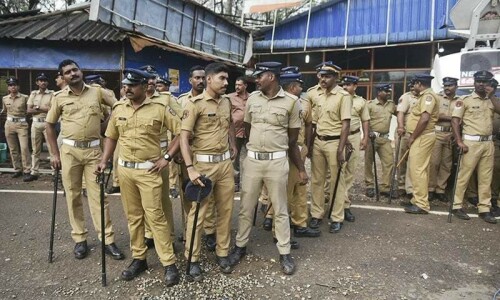KARACHI: The Anti-Narcotics Force (ANF) Sindh organised on Wednesday an interfaith conference on the occasion of the International Day Against Drug Abuse and Illicit Trafficking, bringing together religious leaders of different faiths to address the pressing issue of drug abuse.
Held at the Arts Council of Pakistan, the conference saw a united front from religious leadership as speakers from each faith denounced drug abuse and emphasised that drug abuse was strictly prohibited in their respective religions, reinforcing the universal message that substance abuse undermined the moral and ethical fabric of society.
Representing the Muslim community, president of the Markazi Ulema Council Sindh Maulana Azad Jameel said drug abuse had alarmingly become fashionable and joint efforts were required for its elimination. He stressed the importance of parental involvement in combating that trend and underscored Islamic teachings that viewed drug abuse as harmful and counterproductive.
Right Reverend Frederick John, the Bishop of Karachi and Balochistan Diocese while representing the Christian community affirmed that all religions condemned drug abuse and informed the audience about the rehabilitation work of an institution named Ibtida and urged unity in supporting the ANF’s efforts. Bishop John also highlighted scriptural condemnations of such practices.
Ram Nath Maharaj, representing the Hindu community, cited the prohibition of drug abuse in the Bhagavad Gita and Vedas. He mentioned that his community had initiated sports activities to keep the youth away from drugs.
The Sikh and Parsi speakers also reiterated that their religious doctrines explicitly forbad drug abuse, underscoring a shared commitment to combating that social menace.
Addressing the event, Principal Secretary to the Governor of Sindh Bilal Ahmed Memon commended the Anti-Narcotics Force (ANF) for organising the conference and bringing together various faiths to combat drug abuse.
He highlighted the need to invest in the youth, mentioning that Governor Sindh Kamran Khan Tessori had launched several initiatives, including IT training programs, to keep the people away from such social evil.
He also called on the Muslim scholars to emphasise in their Friday sermons that drug abuse was forbidden.
Arts Council’s president Ahmed Shah also expressed gratitude to the ANF for its efforts in fighting the issue, but stressed that combating drug abuse required collective responsibility. He also pointed out the rising trend of drug abuse in the city’s affluent areas.
Earlier, in his welcome address, ANF Sindh Force Commander Brigadier Umer Farooq emphasised the evolving nature of drug trafficking, noting that the dealers were advancing their methods. He highlighted the rising use and demand for drugs like crystal meth, ecstasy, and methamphetamine among the youth.
He also said that no religion condoned drug abuse and that societal rejection of drugs as forbidden was crucial to reducing demand. He called on religious leaders to collaborate with the ANF in eradicating that scourge according to their beliefs.
Published in Dawn, June 27th, 2024













































Dear visitor, the comments section is undergoing an overhaul and will return soon.